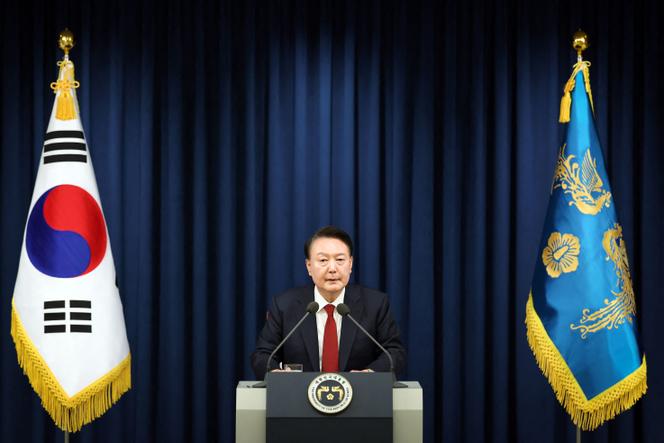


North Korea was central to South Korean President Yoon Suk Yeol's justification for his decision to impose martial law, on the night of Tuesday, December 3. Though the measure was, in the end, rejected by Parliament, the leader had effectively deemed it necessary to protect South Korea from "threats from North Korean communist forces, to eradicate pro-North Korean anti-state forces that are shamelessly destroying the people's freedom and happiness." The special forces units that were deployed in the wake of the declaration were allegedly told about an infiltration of commandos from the North.
A week after the attempted power grab by Yoon, who is now suspected of insurrection and mutiny, and whose offices were raided on Wednesday, December 11, neither the North Korean daily newspaper Rodong Sinmun, nor its central television station, nor the KCNA news agency have mentioned it. This discretion is a calculated move, analyzed Peter Ward of Seoul's Sejong Institute. "The best thing for the North Koreans," he said, "is simply to observe the political chaos in the South. If they were to engage in large-scale provocations, they could create a mobilizing effect against them."
Strategically, silence could thereby prove more interesting for them than provocation or a thundering reaction. "Pyongyang could have seized this opportunity to highlight its position in favor of two separate Koreas, and further isolate the South," said Hong Min, a researcher at the Korean Institute for National Unification (KINU). According to intelligence reports from the South, the North's leaders urgently met on the day after the attempted martial law declaration and performed checks to see if there really had been an incident.
It would, therefore, seem that the North Korean threat was merely a pretext to justify martial law. In October, the North said drones had been flown over Pyongyang. Seoul denied this, but Park Beom-kye, a lawmaker from the opposition Democratic Party (DP), citing a military source, revealed on Monday, December 9, that the drones had indeed been sent on the orders of Defense Minister Kim Yong-hyun, who has been considered to be the mastermind behind the martial law declaration. Under investigation, Kim attempted to end his life on Tuesday, December 10. "The Defense Counterintelligence Command, headed by Yeo In-hyung, appears to have planned the drone dispatch," said Park, recalling that the coup had been prepared by a group of former classmates, including Kim and Yoon, who had attended the same high school.
You have 17.7% of this article left to read. The rest is for subscribers only.
